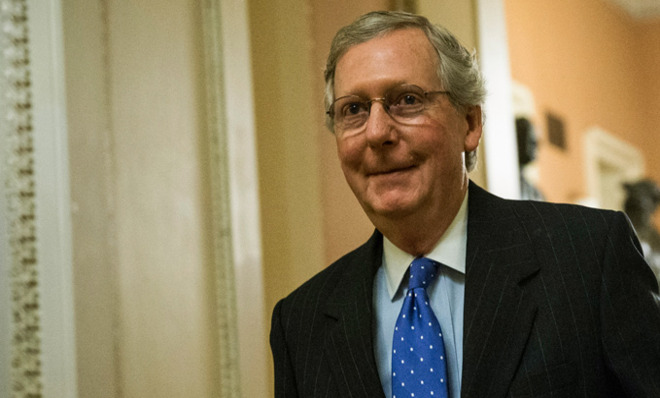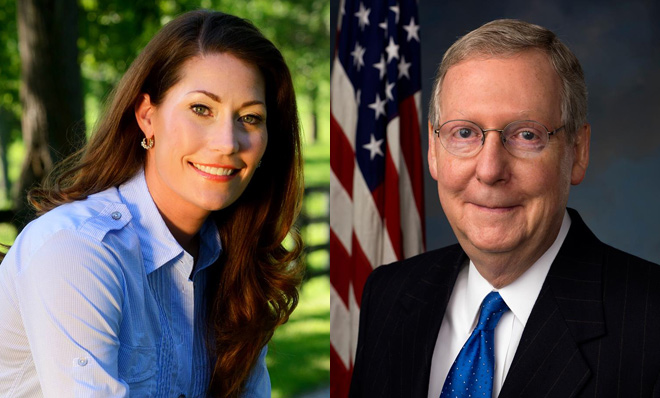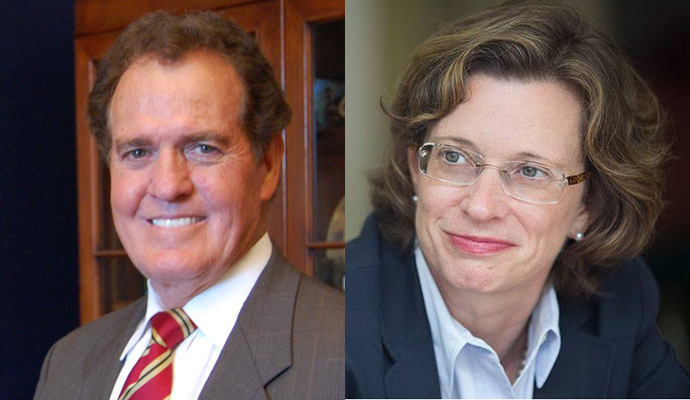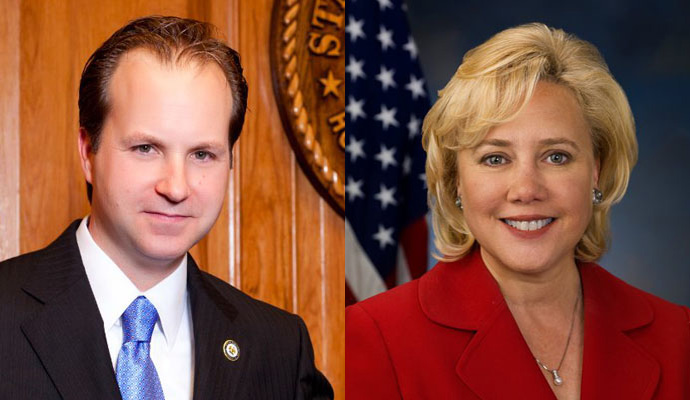7 must-watch Senate races in 2014
With control of the upper chamber on the line, these are the 2014 contests to keep an eye on

A free daily email with the biggest news stories of the day – and the best features from TheWeek.com
You are now subscribed
Your newsletter sign-up was successful
With 10 months to go until the 2014 midterm elections, Democrats and Republicans are gearing up for a huge fight to see which party will control Congress for President Obama's last two years in office.
The GOP is widely expected to hold on to the House, which means the Senate is where most of the action will be this year. There are 33 seats at play, and Republicans need to pick up six seats to take back control. They have a more-than-decent shot: Only 13 GOP seats are up for re-election, leaving the Democrats to defend more territory in a year when the botched ObamaCare rollout is sure to be a main talking point.
But there's another factor in their favor: Polls have consistently shown a handful of Democrats who represent conservative-leaning states trailing their Republican challengers.
The Week
Escape your echo chamber. Get the facts behind the news, plus analysis from multiple perspectives.

Sign up for The Week's Free Newsletters
From our morning news briefing to a weekly Good News Newsletter, get the best of The Week delivered directly to your inbox.
From our morning news briefing to a weekly Good News Newsletter, get the best of The Week delivered directly to your inbox.
Here's a look at the seven races that will be crucial in deciding who holds the majority in the Senate next year.
Kentucky

The candidates: Senate Minority Leader Mitch McConnell, a Republican who is seeking a sixth term; businessman and Tea Party favorite Matt Bevin, who is challenging McConnell in the primary; Kentucky Secretary of State Alison Lundergan Grimes, a Democrat who is seen as an up-and-coming force in state politics.
The big issues: Expect the state of the country's balance sheet to be front and center in this election. Both challengers have attacked McConnell's work on budget issues, albeit from opposite ends of the political spectrum, and say they will fight for a balanced-budget amendment if elected. Support for Kentucky's coal industry, a $6 billion annual business that employs more than 14,000 people throughout the state, will also be an important theme. The most interesting wrinkle: ObamaCare, which should ostensibly work against the Democrat in the race, except for the fact that Kentucky, led by Democratic Gov. Steve Beshear, has one of the best state exchanges in the country.
A free daily email with the biggest news stories of the day – and the best features from TheWeek.com
The context: In many ways, the McConnell-Bevin face-off is a proxy fight for the soul of the GOP. McConnell has been targeted by national conservative groups who think establishment Republicans have sold out their constituents on a variety of issues, including funding ObamaCare. Bevin, a Louisville businessman, has attacked the incumbent for negotiating with Democrats to end the government shutdown and avoid a debt-ceiling default, even though a majority of Kentuckians disapproved of those tactics. McConnell has raised considerably more money than Bevin, but outside organizations like the Senate Conservatives Fund are pouring millions into Bevin's campaign. Despite his low approval ratings, McConnell is expected to defeat his primary challenger — but then he will then have to face Grimes, a formidable opponent who has been polling well in head-to-head matchups with McConnell.
What the polls say: McConnell and Grimes are running neck and neck. A mid-December survey from the left-leaning Public Policy Polling group shows McConnell and Grimes virtually tied with 43 percent and 42 percent of the vote, respectively. Fifteen percent of respondents were undecided. In October, PPP found Grimes leading 45 to 43 percent.
The money war: As expected of the incumbent, McConnell is way ahead, amassing a $10 million stockpile by the end of September last year. But the third quarter of fundraising last year showed a couple of interesting developments. McConnell took in $2.27 million between July and September, but Grimes did even better. In her first quarter as a Senate candidate, she raised $2.5 million. Bevin's haul was paltry in comparison. He took in just $822,000 — and $600,000 of that was his own money.
The fiercest ad: McConnell's camp released a spot in August that tied his primary challenger to state and national Democratic officials, and referred to him as "Bailout Bevin" for receiving $200,000 in aid from Connecticut for his company. The ad, which relies heavily on research from the National Review, repeats a clip of Bevin supposedly telling a group of Democrats, "We're on the same team here, I'll tell you that much."
North Carolina

The candidates: Democratic Sen. Kay Hagan, a first-termer who has also served in the state legislature, is running for re-election. On the GOP side, there are five vying for the chance to unseat Hagan: State House Speaker Thom Tillis, the most prominent Republican in the race; Tea Party favorite Greg Brannon, who picked up an endorsement from Kentucky Sen. Rand Paul; Rev. Mark Harris; Heather Grant, a nurse; and Bill Flynn, a local radio broadcaster.
The big issues: This race is going to come down to Hagan's support for the president's health-care overhaul. Millions of dollars have been flowing into the state since October to buy advertising linking her to President Obama and the flawed HealthCare.gov rollout. Republicans will also likely attack Hagan for voting to improve background checks for gun owners even though the bill eventually failed.
The context: The Republicans see this race as a must-win if they want to take back the Senate. Hagan, who rode Obama's coattails to office in 2008, is vulnerable because the political landscape in the Tar Heel state has changed dramatically since then. Six years ago, the president eked out a victory by 14,000 votes. By 2012, however, Obama's popularity had waned, and he lost North Carolina by 100,000 votes while the Republicans picked up the governorship and a few house districts. Hagan has positioned herself as a moderate independent of her party, and tried to focus on her support for the military, as well as her work to reduce the debt. She will most likely face Tillis, a staunch conservative who wants to defund ObamaCare and is against gay marriage. The competitive GOP primary, however, may give Hagan a boost as the four contenders try to jockey for the position of "most conservative" in the race. Furthermore, Hagan may benefit from a moderate-liberal backlash against the state's dramatic rightward turn under Republican leadership.
What the polls say: Hagan has seen her lead all but evaporate in the last few months. In September, PPP's numbers showed Hagan up by 12 to 17 points over all of her challengers (with the exception of Flynn, who didn't enter the race until two months later). By November, she was trailing Brannon by one point and the rest of the Republican field had cut her lead down to two or three points. Through December, the race looked like a toss-up.
The money war: Tillis has been out-fundraising his GOP competitors, but his campaign only took in $830,000 by the end of September. (That number includes $250,000 he lent himself.) Party heavyweights like Karl Rove, Mitch McConnell, and Sen. Richard Burr (N.C.) are stepping in to help him boost his numbers. Hagan, on the other hand, has taken in more than $7.8 million this election cycle.
The fiercest ad: It's hard to choose one, as anti-Hagan forces have blanketed the airwaves with multimillion dollar advertising buys. Most of the television spots have hit Hagan over her vote in support of health-care reform.
Georgia


Laura Colarusso is a freelance journalist based in Boston. She has previously written for Newsweek, The Boston Globe, the Washington Monthly and The Daily Beast.
-
 The billionaires’ wealth tax: a catastrophe for California?
The billionaires’ wealth tax: a catastrophe for California?Talking Point Peter Thiel and Larry Page preparing to change state residency
-
 Bari Weiss’ ‘60 Minutes’ scandal is about more than one report
Bari Weiss’ ‘60 Minutes’ scandal is about more than one reportIN THE SPOTLIGHT By blocking an approved segment on a controversial prison holding US deportees in El Salvador, the editor-in-chief of CBS News has become the main story
-
 Has Zohran Mamdani shown the Democrats how to win again?
Has Zohran Mamdani shown the Democrats how to win again?Today’s Big Question New York City mayoral election touted as victory for left-wing populists but moderate centrist wins elsewhere present more complex path for Democratic Party
-
 Millions turn out for anti-Trump ‘No Kings’ rallies
Millions turn out for anti-Trump ‘No Kings’ ralliesSpeed Read An estimated 7 million people participated, 2 million more than at the first ‘No Kings’ protest in June
-
 Ghislaine Maxwell: angling for a Trump pardon
Ghislaine Maxwell: angling for a Trump pardonTalking Point Convicted sex trafficker's testimony could shed new light on president's links to Jeffrey Epstein
-
 The last words and final moments of 40 presidents
The last words and final moments of 40 presidentsThe Explainer Some are eloquent quotes worthy of the holders of the highest office in the nation, and others... aren't
-
 The JFK files: the truth at last?
The JFK files: the truth at last?In The Spotlight More than 64,000 previously classified documents relating the 1963 assassination of John F. Kennedy have been released by the Trump administration
-
 'Seriously, not literally': how should the world take Donald Trump?
'Seriously, not literally': how should the world take Donald Trump?Today's big question White House rhetoric and reality look likely to become increasingly blurred


